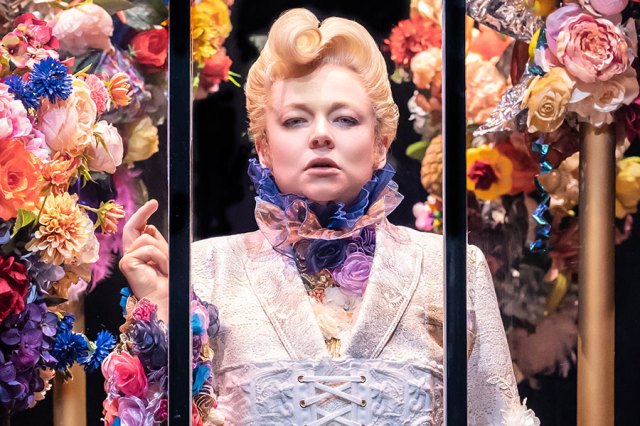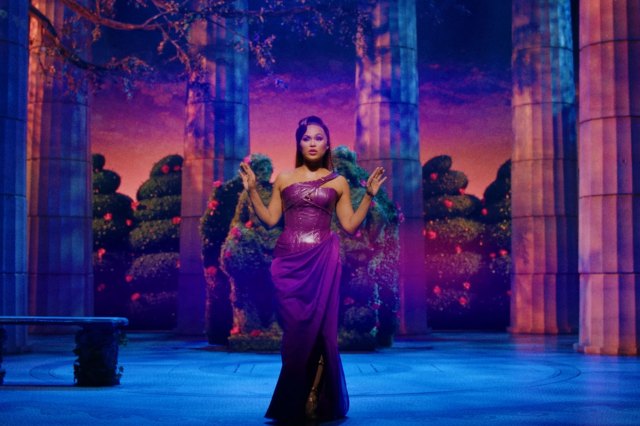The Picture of Dorian Gray review – Sarah Snook goes Wilde in the West End
The digital heavy production runs at Theatre Royal Haymarket

Unlikely one person shows are becoming a thing – and not only for the cost benefits. After Andrew Scott’s one-man Vanya, in which the award-winning actor took on the nine characters in Chekhov’s play and offered revelation as a side order to versatility, now Sarah Snook sweeps into the West End, taking on a staggering 26 characters in a new version of Oscar Wilde’s novel. She is equally impressive.
At first the production, adapted and directed by Kip Williams and already seen (with Eryn Jean Norvill starring) in Australia, feels gimmicky. Snook, fresh from picking up multiple prizes for her performance as Shiv Roy in Succession, appears semi-concealed behind a video screen. A camera beams onto it each close-up expression on her face as she flits between the roles of the painter Basil Hallward and his friend Lord Henry Wootton, a paintbrush in hand for one, and a sneer and cigarette for the other.
When Dorian Gray appears, she adopts an angelic smile, and pulls on a bubble-blonde wig, tossing her head as he makes his fatal wish: since, according to Wootton “youth is the one thing worth having”, Gray pledges his soul to be always young as the picture grows old.
So far so clever. But as the terrible implications of that contract become evident, the power of the production to embody all the story’s obsessions with appearance and hedonism in ways that exactly reflect the 21st century’s devastating preoccupations, becomes overwhelming. As Snook flits through the action, she is constantly surrounded by screens showing her image, sometimes as other characters with whom she interacts, sometimes as herself, narrating the story, sometimes as fixed portraits that surround her. The sense of egotism, of overweening self is dizzying.
In one coruscating scene, as Dorian talks about hiding his soul from the eyes of men, she manipulates his image with the screen-filters on an iPhone, creating a picture of ultimate beauty, using the camera as a tool for transformation. Later, as the story depicts Dorian on the run from the weight of the sins he is committing in pursuit of self-expression, Snook vanishes beneath the stage as the phone beams altered pictures of different characters onto multiple screens above.
It’s brilliantly and imaginatively done, with the on-stage camera operators and crew, David Bergman’s videos, and Clemence Williams’ sound all playing a vital, lively part. The set by Marg Horwell is often full of flowers, which also fill the filmed passages, their overwhelming heavy blooms creating a visual metaphor for the freshness and decay, both spiritual and real, that permeates Wilde’s vision.
What’s extraordinary about his writing is not just the aphorisms – “the only thing worse than being talked about, is not being talked about” – but just how relevant it still seems. His overwhelming sense of hypocrisy, the way that conflicting values and desires lie beneath the surface of life, eating away at the soul feels just as pertinent to modern life as it did to the 1890s. Indeed, some of his observations – “to get back my youth I would do anything in the world, except take exercise, get up early or be respectable” – sound as if they were specially written for today.
Williams cleverly plays on this contemporaneity, creating a phantasmagorical sequence of effects that are both pitched in the past and yet perfectly conjure the dominance of self and appearance in modern culture. Sometimes, I longed for the production to be quieter, less loud, a little more moving, but the culminative effect of its acceleration towards doom is undoubtedly effective, suggesting Gray has reached the point where he cannot shut out the noise of his own thoughts.
At the heart of all this stands Snook, who is utterly superb. Her confidence on stage is breathtaking; she owns the space, elegantly playing with all the technology, never being drowned by it. Given how big the effects around her sometimes are, how broad the comedy and sweeping the melodrama, she acts with remarkable subtlety and sensitivity, not only convincing as the multiple characters, but conveying the great moral thread that lies beneath Wilde’s supreme cry from the heart.















